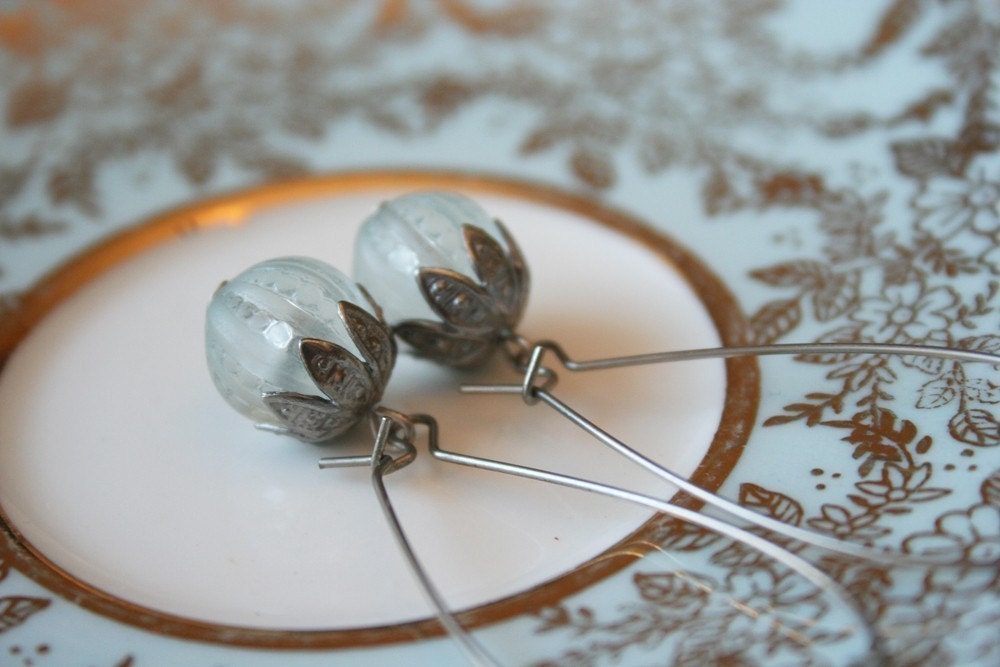Since the inception of Word Nerd Wednesday, I've gotten lots of suggestions for issues to address. (Keep 'em coming! You can leave ideas in the comments or e-mail them to me.)
I'll discuss a just handful today.
Might CouldErin brought up this particularly annoying phrase, used as:
I might could go to the movie tonight.Might could is a dialectal thing, but it's definitely not acceptable in standard English. Depending on the quirk, I find some dialectal things intriguing rather than annoying. This one, however, bugs me, because it makes no sense.
It's like a some funky compound version of, "I might go to the movie tonight" and, "I could go to the movie tonight," or perhaps they're really meaning, "I
might be able to go to the movie tonight."
But since when does
could mean
be able to?In the mistsA
malapropism is when one (incorrect) word is accidentally substituted for the word the speaker means. I love catching these puppies, because they're often really funny. My linguist father has a running list of malapropisms he hears from others, and it's hysterical to read.
Another term for them is "Dogberryisms," named after the character of Dogberry in Shakespeare's
Much Ado about Nothing (and we all know how much I love me some
Much Ado!). Dogberry's lines are full of malapropisms, some of the funniest parts of the whole play.
(Michael Keaton performs the role brilliantly in the movie. Now I'm almost wishing I'd worked a Dogberry character into
Spires.)
Lara brought up a malapropisms seen a lot on blogs: "in the mists" such as, "I was in the mists of making a project."
Of course, what the writer means is
in the midst (or in the middle of) making a project.
SupposablyBrooke mentioned another peeve of mine: using
supposably for
supposedly.Technically,
supposably is a word, but it doesn't mean what its speakers generally use it for.
Supposably means something is
able to be supposed, not that something
allegedly happened or
is mistakenly believed to have happened, which is what
suppsedly means.
Feeling PoorlyMina mentioned this one. It always brings a smile to my face, because I remember my beloved professor, Dr. Oaks, acting it out in class.
First off, the correct version isn't
I feel poorly, but rather,
I don't feel well.Remember:
poorly would mean you don't have a skill for feeling.
Just like you might ice skate poorly or cook poorly, if you
feel poorly, you're doing a bad job of it.
Dr. Oaks demonstrated, pretending to feel the desks, the chalkboard, and the wall, but doing so in an inefficient way: with his hands palm side up so the only contact was with the back of his hand.
He was feeling poorly. If you're sick, you're not feeling
well.Their/There/They're and Your/You'reHeffalump suggested that some common homophones be mentioned, particularly their/there/they're and your/you’re.
Since they sounds alike (duh, since they're are
homophones), it's easy to mix them up (or easy to type the wrong one even when you know which is which).
A refresher:
Their is the possessive pronoun for
they:Their car was repossessed.There refers to location:
Put the newspaper over there on the table.They're is a contraction of
they and
are:Tonight they're going out to eat.Now for
your/you're:Your is possessive:
I love your new haircut.You're is a contraction of
you and
are:You're in ninth grade now, right?VoilaMelanie J brought up one that I have a hard time understanding the confusion on, but I've seen it myself, so here we are:
Using
wa-la for
voila.(I think I just heard
Erin, francophile, gasp and faint.)
Voila is a French word meaning (according to Merriam-Webster), "see there." In English, it's used, "to call attention, express satisfaction or approval, or to suggest an appearance by magic."
But it's not pronounced with a W.Lose/LooseFinally,
Lucy added a word pair very, very commonly misused. This time, they're not even homophones. I think the error is made because they simply
look alike, the difference being whether the word has one or two Os in it:
Lose (with one O) refers to is when something is gone, missing, destroyed,
lost:Almost every day, I lose my keys.Loose is the opposite of
tight:Tighten the strap; it's too loose.For fun, let's combine them:
After losing weight, her pants were too loose.See? Not so hard, right?
Today's Tour Stop:Life in the Sagebrush(I think this is third time someone has quoted the section about Samuel's disgusting work smells. I so rock at making readers sick to their stomachs! Gross smells aside, it's a hugely flattering review. Thanks, Brooke!)
































